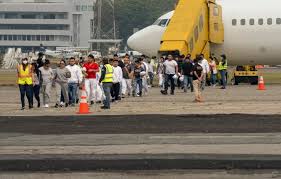On Tuesday, July 15, 2025, the Trump administration announced the deportation of five foreign nationals to Eswatini, a small kingdom in Southern Africa. The men, who were deported as “criminal illegal aliens,” hail from Vietnam, Laos, Yemen, Cuba, and Jamaica. According to the Department of Homeland Security (DHS), these individuals were considered “uniquely barbaric” due to their criminal records, and their home countries had refused to take them back.
This move is part of the Trump administration’s broader policy to send deported individuals to third countries, particularly those whose home countries are unwilling to accept them. The deportation of these five men follows a similar action taken earlier in July when eight other migrants were sent to South Sudan, a nation in conflict, after a Supreme Court ruling authorized the action.
Eswatini, the country receiving the deportees, is Africa’s last absolute monarchy, led by King Mswati III since 1986. King Mswati has faced significant criticism for his extravagant lifestyle and accusations of human rights violations. Eswatini is landlocked and surrounded by South Africa and Mozambique, and it has a population of about 1.1 million.
The move to send criminal migrants to Eswatini has sparked controversy, as the country has not previously been a prominent destination for deported individuals. Many have raised concerns about the safety and human rights conditions in the country, particularly given its leadership and ongoing political tensions.
Despite these concerns, the US government maintains that the deportations are a necessary step in ensuring public safety and upholding immigration policies. However, this action highlights the broader challenges facing both the US and the countries accepting these deported individuals.



